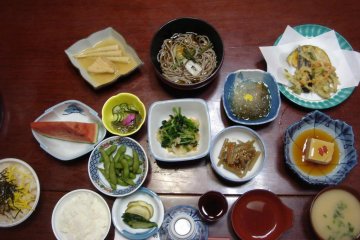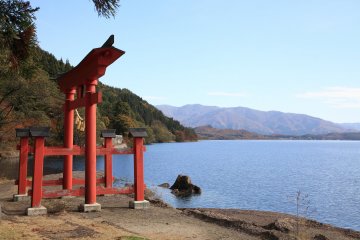Mystery, beauty, elegance. These are just a few elements that a maiko embodies. An apprentice geisha, maiko undertakes specialized training in various forms of art, including traditional dance, the shamisen, a type of Japanese stringed instrument, and tea ceremony. Their faces painted white, dainty red lips giving away a hint of a smile, and floating in beautiful kimono. How can they not be simply alluring?
Fancy meeting a maiko?
Welcome to the Somaro Teahouse, once the most popular venue for sailors, who spent overwhelming sums seeking the great beauties of the old port town of Sakata. Renovated and renamed in 2000 after being registered as a Tangible Cultural Property in 1996, today’s Somaro is not the same ryotei, or traditional restaurant. In the Edo Period, it was known as Soma-ya. The old Soma-ya was actually the setting of the infamous “Soma-ya incident,” in which Sakata’s wealthy merchants were accused of dishonoring the Imperial family when they were discovered throwing lavish banquets dressed as the emperor, empress, and other members of the Imperial family.
Even today, Somaro is perhaps one of the top destinations to seek maiko. Simply entering the teahouse, you are greeted warmly by a maiko in all her radiance. I did not expect to actually exchange words with a maiko before I visited Somaro, and was far from prepared for my close-up encounter. Seeing a maiko in Japan has been a dream of mine, so you can imagine my surprise and complete loss for words and any ability to function like a normal human being after casually walking into Somaro. The maiko spoke, I did not really know what she said because of my limited Japanese communication skills, failed to respond accordingly largely also because I was stunned, and it was amazing. In other words, I had a “fan-girl” moment.
I always assumed that an encountering maiko would be a fleeting instance, allowing me to only catch a glimpse as she glided by. In Kyoto, this was certainly the case. However, in Somaro, you speak freely to a maiko as you would a staff member.
Somaro is both a museum and a teahouse that welcomes visitors to explore its beautiful interior. Learn about the history of geisha in Sakata, appreciate the paintings of Takehisa Yumeji, and indulge in perhaps the greatest attraction of all, seeing maiko dance. Visitors have the option of enjoying the maiko perform while having a bento lunch for a fee of ¥3,500 at 12:00 pm, or without a meal for ¥1,000 at 2:00 pm everyday, except Wednesdays and special holidays. These fees also cover the entrance cost to visit the teahouse and its exhibitions. Fees are ¥700 for adults, ¥500 for junior and senior high school students, ¥300 for elementary school and kindergarten students, and free for children under 3 years of age. Photography is prohibited during the dance, but visitors can take photos of and with the maiko afterwards. The dance was beautiful, but that is all I will say so you’ll have to see it for yourself!
Although all I managed to say throughout my visit to Somaro was “arigatougozaimasu” countless times, and “you’re so pretty” to one of the maiko, to which she replied “thank you!”, it was one of the best days I had in Japan. So if you do speak Japanese, definitely do not miss out on the rare opportunity to converse with a maiko. Now off to Somaro you go!









